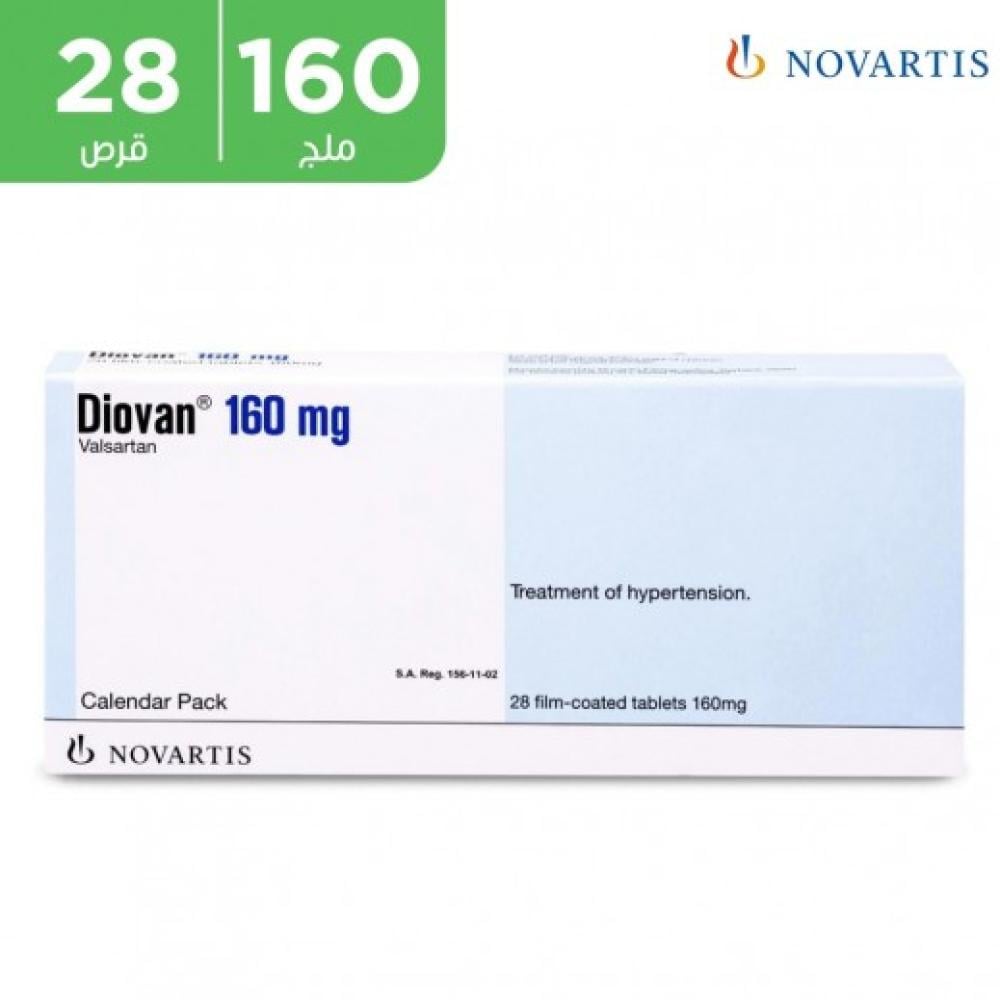Product Description:
- Please note that your doctor may have prescribed this medicine for different uses and/or at a different dose than indicated in the package insert. Always follow your doctor's instructions.
The active ingredient is valsartan in different concentrations:
- Valsartan belongs to a group of medicines called angiotensin II receptor blockers, which are used to treat high blood pressure.
- Angiotensin II is a substance in the body that causes blood vessels to constrict, leading to increased blood pressure.
- Valsartan works by blocking the effects of angiotensin II.
- The result is that blood vessels relax and blood pressure decreases.
Valsartan 40 mg film-coated tablets can be used against three different disorders:
- Treatment of high blood pressure in children and adolescents aged 6 to 18 years.
- High blood pressure increases the workload on the heart and arteries. If left untreated, it can damage blood vessels in the brain, heart, and kidneys, leading to stroke, heart failure, or kidney failure. High blood pressure also increases the risk of a heart attack.
- When blood pressure drops to normal levels, the risk of developing these disorders decreases.
- Treatment of adult patients who have recently had a myocardial infarction (heart attack). "Recent" here means between 12 hours and 10 days ago.
- Treatment of symptomatic heart failure in adult patients.
- Valsartan is used when a group of medicines called angiotensin-converting enzyme (ACE) inhibitors (medicines used to treat heart failure) cannot be used, or it may be used in addition to an ACE inhibitor when other medicines for heart failure cannot be used.
Symptoms of heart failure include:
- Shortness of breath and swelling in the feet and legs due to fluid accumulation.
- It results from the inability of the heart muscle to pump enough blood to meet the body's needs.
Valsartan 80 mg film-coated tablets can be used against three different disorders:
- Treatment of high blood pressure in adults, children, and adolescents aged 6 to under 18 years.
- High blood pressure increases the workload on the heart and arteries. If left untreated, it can damage blood vessels in the brain, heart, and kidneys, leading to stroke, heart failure, or kidney failure.
- High blood pressure increases the risk of a heart attack.
- When blood pressure drops to normal levels, the risk of developing these disorders decreases.
- Treatment of adult patients who have recently had a myocardial infarction (heart attack). "Recent" here means between 12 hours and 10 days ago.
- Treatment of symptomatic heart failure in adult patients.
- Valsartan is used when a group of medicines called angiotensin-converting enzyme (ACE) inhibitors (medicines used to treat heart failure) cannot be used, or it may be used in addition to an ACE inhibitor when other medicines for heart failure cannot be used.
- Symptoms of heart failure include shortness of breath and swelling of the feet and legs due to fluid buildup.
- It results from the inability of the heart muscle to pump enough blood to meet the body's needs.
Valsartan 160 mg film-coated tablets can be used against three different disorders:
- Treating high blood pressure in adults, children, and adolescents aged 6 to under 18 years. High blood pressure increases the workload on the heart and arteries.
- If left untreated, it can damage blood vessels in the brain, heart, and kidneys, leading to stroke, heart failure, or kidney failure. High blood pressure increases the risk of a heart attack. When blood pressure is lowered to normal levels, the risk of these disorders decreases.
- Treatment of adult patients who have recently had a myocardial infarction (heart attack). "Recent" here means between 12 hours and 10 days ago.
- Treatment of symptomatic heart failure in adult patients.
- Valsartan is used when a group of medicines called angiotensin-converting enzyme (ACE) inhibitors (medicines used to treat heart failure) cannot be used, or it may be used in addition to an ACE inhibitor when other medicines for heart failure cannot be used.
- Symptoms of heart failure include shortness of breath and swelling of the feet and legs due to fluid buildup.
- It results from the inability of the heart muscle to pump enough blood to meet the body's needs.
Valsartan 320 mg film-coated tablets can be used for:
- Treating high blood pressure in adults, children, and adolescents aged 6 to under 18 years. High blood pressure increases the workload on the heart and arteries.
- If left untreated, it can damage blood vessels in the brain, heart, and kidneys, and can lead to stroke, heart failure, or kidney failure.
- High blood pressure increases the risk of a heart attack.
- When blood pressure drops to normal levels, the risk of developing these disorders decreases.
Directions for use:
- Always use this medicine exactly as your doctor has told you to get the best results and reduce the risk of side effects. Contact a doctor or pharmacist if you are unsure.
- People with high blood pressure often don't notice symptoms, so many feel well.
- Therefore, it is very important to keep appointments with your doctor even if you feel well.
- Adult patients with high blood pressure
The recommended dose is 80 mg daily.
- In some cases, your doctor may prescribe higher doses (such as 160 mg or 320 mg).
- Valsartan may also be combined with another medication (such as a diuretic).
- Children and adolescents (6 to under 18 years old) with high blood pressure
In patients weighing less than 35 kg:
- The recommended starting dose of valsartan tablets is 40 mg once a day.
In patients weighing 35 kg or more:
- The recommended starting dose of valsartan tablets is 80 mg once a day.
- In some cases, your doctor may prescribe higher doses (the dose can be increased to 160 mg and a maximum of 320 mg).
- Valsartan oral solution is recommended for children who are unable to swallow tablets.
- In adult patients recently diagnosed with a myocardial infarction (MI), treatment is usually initiated within 12 hours of the onset of a heart attack, usually at a low dose of 20 mg twice daily.
- The 20 mg dose can be obtained by dividing the 40 mg tablet.
- Your doctor will gradually increase this dose over several weeks to a maximum of 160 mg twice a day.
- The final dosage depends on what you can tolerate as an individual patient.
- Valsartan may be given with other heart attack treatments, and your doctor will decide which treatment is right for you.
Adult patients with heart failure:
- The usual starting dose is 40 mg twice a day.
- Your doctor will gradually increase this dose over several weeks to a maximum of 160 mg twice a day.
- The final dose depends on what you as an individual patient tolerates.
- Valsartan may be given with other treatments for heart failure and your doctor will decide which treatment is right for you.
- Valsartan can be taken with or without meals.
- Valsartan is swallowed with a glass of water.
- Take valsartan at about the same time every day.
If you take too much valsartan:
- Call a doctor, hospital, or poison control center if you take too much medicine or if a child accidentally takes the medicine.
- For other questions about the medicine, contact your doctor or pharmacist.
- If you feel very dizzy and/or feel like you are going to pass out, call your doctor immediately and lie down.
- Contact a doctor, pharmacy, or hospital if you accidentally take too many tablets.
If you forget to take valsartan:
- If you miss a dose, take it as soon as you remember. However, if it is almost time for your next dose, skip the missed dose.
- You should not take a double dose to make up for a missed dose.
If you stop treatment with valsartan:
- If you stop treatment with valsartan, your disease may get worse.
- Do not stop using the medicine unless your doctor tells you to.
- Ask your doctor or pharmacist if you have any questions about the use of this medicine.
Warnings and Precautions:
Do not use Valsartan:
- If you are allergic (hypersensitive) to valsartan or any of the other ingredients of this medicine.
- If you have severe liver disease.
- If you are 3 months or more pregnant.
- If you have diabetes or decreased kidney function and are being treated with a high blood pressure medicine containing aliskiren.
- If any of these conditions apply to you, contact your doctor and do not take valsartan.
Tell your doctor:
- If you have liver disease.
- If you have severe kidney disease or if you are on dialysis.
- If you have renal artery stenosis.
- If you have recently had a kidney transplant (received a new kidney).
- If you have a serious heart condition other than heart failure or a heart attack.
- If you have ever had swelling of the tongue and face caused by an allergic reaction called angioedema when using other medicines (including ACE inhibitors), tell your doctor.
- If you experience these symptoms while using valsartan, stop using valsartan immediately and do not use it again.
- If you are using medications that increase the amount of potassium in your blood.
- This includes potassium supplements or salt substitutes containing potassium, potassium-sparing medications, and heparin. It may be necessary to check your blood potassium level at regular intervals.
- If you have aldosteronism. This is a condition in which the adrenal glands produce too much of the hormone aldosterone.
- If this applies to you, valsartan is not recommended.
- If you lose a lot of fluid (dehydration) due to diarrhea, vomiting, or high doses of water pills (diuretics).
the components:
- The active ingredient is valsartan.
Available in different concentrations and by multiple manufacturers:
- Valsartan 40 mg coated tablets.
- Valsartan 80 mg coated tablets.
- Valsartan 160 mg coated tablets.
- Valsartan 320 mg coated tablets.


